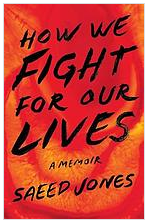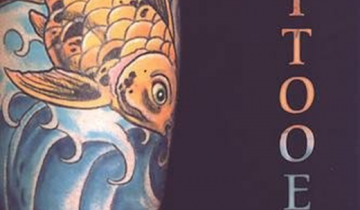Pride and Oppression: On the Act of Listening in 2020
by Andrew T. Powers
Pride 2020 fell in a June unlike any June we’re likely to witness again. It’s an election year on an ugly political landscape with a volatile citizenry; we’ve been (and continue to be) ravaged by COVID-19, a virus deadlier than any this country has seen in a hundred years; now it’s summertime, and just as many of us are coming out of stay-at-home dictates, we’re learning that we might need to go back into isolation. Throw into this a new (to some of us) understanding of the violence perpetuated by a racist social structure, brought into focus by the global response to the murder of George Floyd.
And the year is only halfway done.
I could fall into line with nihilists and doomsayers and welcome the apparent crumbling of civilization—but I’m a middle-aged man and no longer have the desire to see the world burn. So I’ve committed myself to making a sustained effort to widen the scope of my cultural understanding in a search for something better. Pride Month proves a useful (ahem, fruitful) lens through which to explore the current events of the day, by which I hope to arrive at a glimpse of the best path forward.
#
In times of fear and confusion, I find in the pages of literature a constant companion that offers consolation and prompts reflection. On countless occasions, I’ve revisited the prefatory chapter of Kurt Vonnegut’s Slaughterhouse-Five, the story “The Lives of the Dead” in Tim O’Brien’s The Things They Carried, and the last page of F. Scott Fitzgerald’s The Great Gatsby. There’s something in these pages that offer an opportunity for catharsis, a time for reflection, and a glimmer of hope, all while giving me my fix of great writing. There are other books like this, and I’m always on the look-out for the next book that will speak to me. It’s not always the book I thought it would be, or wanted it to be, but it’s the one whose voice I hear at just the right moment.
 It’s fortuitous (to say the least) that I picked up Saeed Jones’ How We Fight for Our Lives, this year’s winner of the Israel Fishman Non-Fiction Award (Stonewall Book Awards), and Lambda Literary Award-winner in the category of Gay Memoir/Biography. For those of you not familiar with it, the book is in many ways a eulogy to his mother and a testament to the struggles of children of single parents, and among other things it is a piece of exploratory autobiography, a personal meditation on race and racism, sexuality and homophobia, as gleaned from key experiences of young Saeed’s life, his life as a young poet honing his craft while growing into an understanding of what it is to be a gay man in America—as a gay black man living in Texas. As a gay man myself, I found the overlap in our experiences helpful as I attempt to arrive at a better understanding of this historical moment, June 2020.
It’s fortuitous (to say the least) that I picked up Saeed Jones’ How We Fight for Our Lives, this year’s winner of the Israel Fishman Non-Fiction Award (Stonewall Book Awards), and Lambda Literary Award-winner in the category of Gay Memoir/Biography. For those of you not familiar with it, the book is in many ways a eulogy to his mother and a testament to the struggles of children of single parents, and among other things it is a piece of exploratory autobiography, a personal meditation on race and racism, sexuality and homophobia, as gleaned from key experiences of young Saeed’s life, his life as a young poet honing his craft while growing into an understanding of what it is to be a gay man in America—as a gay black man living in Texas. As a gay man myself, I found the overlap in our experiences helpful as I attempt to arrive at a better understanding of this historical moment, June 2020.
#
Pride Month serves as a reminder of why coming out of the closet is so important an event in the life of a gay man, and the difficulty in what becomes the lifelong process of coming out, over and over again. Fear looms large in the lives of gay men, and coming out is the story of the courage we found to face it, a confrontation made all the more harrowing by the fact that it is a battle made always in silence and often in isolation. Many things stand in the way: shame, familial rejection, depression, homelessness, the terror of AIDS, among other things. Sometimes this proves too much for a young man to absorb, pushing him into the arena of suicidal ideation, drug abuse, and alcoholism. There’s little wonder that coming out is often followed by a retreat back into the closet.
“Just over a year since I’d come out to my mother,” Jones writes, “it was like that hard-earned conversation hadn’t happened at all. We both slid back into the hazy silence we’d inhabited before I went to college. Maybe I was pushing her too far, I wondered. People need time and parents are certainly people, right? Still, I wanted—needed—to find a way to tell her that I was…I didn’t even know where to begin. Maybe it was best that she kept avoiding me.” Staying out of the closet becomes the issue. In the closet is a suffocating comfort. It might be awful (okay, it is awful), but it’s an awful to which you’ve grown accustomed. I struggle with this myself, even now in middle age. Pride Month has become a time of reflection, a time to address and confront my fears, both real and imagined, and to come out of the closet—again—a struggle whose dividend is a recommitment to living a life of honesty.
#
Courage is a skill that must be practiced and honed. Coming face to face with discrimination, with an ill-tempered look or an unkind word, never ceases to shock me out of myself. Maybe life isn’t meant to be comfortable or easy, but the threat of bullying (and violence) looming as a very real possibility has a way of stunting emotional growth.
Jones recalls watching news accounts of two murders that happened in 1998. On June 7, James Byrd, Jr., a black man, was beaten by three white supremacists before being chained to a truck and dragged more than a mile down a country road in Jasper, Texas. Four months later, on the night of October 6, a young gay man by the name of Matthew Shepard was beaten, tied to a fence, and left to die near Laramie, Wyoming.
In reading Jones’ account of the murders, I remembered just how shocking these deaths were at the time. Shepard’s death delivered the greater emotional blow to me at the time, as we were both 21-year-old gay (white) college students, but Byrd’s death also stands out in memory. Underscoring the similarity of these murders, Jones brings into sharp relief how they were both manifestations of the same evil that continues to destroy this country: hatred. These instances of violence, against two people to whom he could relate—Byrd’s murder fueled by racial hatred, Shepard’s by homophobic hatred—really shook young Saeed. He writes: “Just as some cultures have a hundred words for ‘snow,’ there should be a hundred words in our language for all the ways a black boy can lie awake at night.”
I’d like to say that these deaths delivered a wake-up call to this country, but if it did, it was to an America fond of hitting the snooze button into perpetuity, as little has changed even though these calls are coming with greater frequency. The terror doesn’t fall in hearing about these deaths so much as that these are just the deaths we hear about. There are others, many others. The current worldwide protests against systemic racism and police brutality resulting from the murder of George Floyd give me hope that—please, God—we will stay awake this time. That we are witnessing a moral summons, a global call to action for an increasing number of those ready to hear it. Coming out of silence and apathy, many are listening to the anger and grief for the first time, and readying themselves for the work that needs to happen to create change in this country. This year’s Pride has taken on a new dimension—or rather, it’s remembering more forcefully its history—by recognizing that the fight against inequality isn’t limited to individual groups of people, but to all of us collectively. Yesterday I saw a picture from a protest in which people held up a banner that voiced a sentiment which read: NO PRIDE FOR SOME OF US WITHOUT LIBERATION FOR ALL OF US. That’s never been truer than now.
#
Sufferings of LGBTQ+ folks aren’t always marked by acts of physical violence; the impact of internalized homophobia can’t be underestimated: it destroys self-esteem and instills a fear that inhibits emotional growth and often propels one towards alcoholism, drug abuse, depression and suicidal ideation (or worse). Matthew Shepard has become an icon in the LGBTQ+ community, as his name serves to bolster individual resolve to live a life of honesty and integrity in the face of all forms of oppressive abuse and brutality and everything else that is killing us. Every June I’m reminded that coming out, privately or publicly, requires a great deal of courage; it is an act of rebellion against a status quo that would have us stay silent, assimilate, become invisible. Despite what Bud Lite-sponsored Pride Month advertisements try to sell us, Pride isn’t an excuse to flaunt our “freedom” with glitter and our best pair of rainbow-striped Speedos. No, no, and no. Pride is an exclamation, a howl of disgust and anger at all that is ugly in this country, and a call to vigilance. It must encompass all struggles against oppressive systems, and must especially now include a serious reckoning with racial oppression in this country.
#
So many of the problems we continue to encounter in this world stem from a failure, if not outright refusal, to listen to one another, as the current state of this country makes apparent. I’m among a growing number of people actively seeking a better path forward, as a people and a culture, and I believe my job always goes back to willingness; a willingness to listen, and a willingness to change; all while fighting the urge to ignore what is uncomfortable to hear.
And it is becoming increasingly evident that reading shouldn’t be simply an escape from reality, but rather that literature ought to be among the tools we use to escape from the lies that have shaped our reality. The reading life for me is an ongoing search for honest writing that spurs reflection and prompts personal growth. In June 2020, How We Fight for Our Lives joined the ranks of other tools on my bookshelf, but it won’t stop there. In the chapter covering January 2008, we find Jones looking through his notebook and lamenting the invisibility of gay black poets, and how they all but disappear from “literature’s memory.” He sees this as a call to dedicate himself all the more to living his life, writing his truth, and rescuing from obscurity the work of those who are now gone: Essex Hemphill, Joseph Beam, Assotto Saint, Reginald Shepherd, among others, authors whose books are now on my TBR list and which I expect will help facilitate future conversations and encourage greater cultural understanding. When, I wonder, will we finally arrive at a time in history when sincere and respectful listening will be an act of rebellion, one to further our endless journey in the search for those answers whose questions sustain us.


